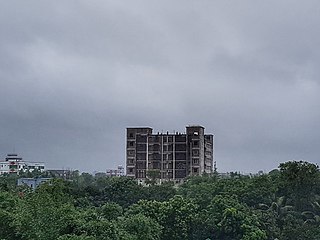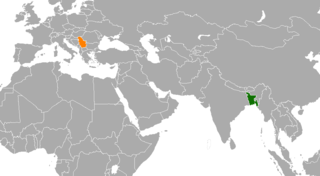
The economy of Bangladesh is a major developing market economy. As the second-largest economy in South Asia, Bangladesh's economy is the 34th largest in the world in nominal terms, and 25th largest by purchasing power parity. Bangladesh is seen by various financial institutions as one of the Next Eleven. It has been transitioning from being a frontier market into an emerging market. Bangladesh is a member of the South Asian Free Trade Area and the World Trade Organization. In fiscal year 2021–2022, Bangladesh registered a GDP growth rate of 7.2% after the global pandemic. Bangladesh is one of the fastest growing economies in the world.

The lungi is a type of sarong that originated in the Indian subcontinent. The lungi, which usually multicoloured, is a men's skirt usually tied around the lower waist below the navel. it can be worn as casual wear and night wear, in places and climates where the heat and humidity increase sweating, and make it unpleasant or uncomfortable to wear closed and tight clothes such as trousers.

Sherwani is a long-sleeved outer coat worn by men in South Asia. Like the Western frock coat it is fitted, with some waist suppression; it falls to below the knees and is buttoned down the front. It can be collarless, have a shirt-style collar, or a stand-up collar in the style of the Mandarin collar. It evolved in the Indian subcontinent in the 19th-century as a result of the outer garment of the late Mughal period, the angarkha—itself evolved from the Persian cape, balaba—being given a western style with a button-down front.
The Child Labor Deterrence Act was created by Senator Tom Harkin, and was first proposed in the United States Congress in 1992, with subsequent propositions in 1993, 1995, 1997 and 1999. According to Harkin's website, "This bill would prohibit the importation of products that have been produced by child labor, and included civil and criminal penalties for violators."

The textile and clothing industries provide a single source of growth in Bangladesh's rapidly developing economy. Exports of textiles and garments are the principal source of foreign exchange earnings. By 2002 exports of textiles, clothing, and ready-made garments (RMG) accounted for 77% of Bangladesh's total merchandise exports. Emerging as the world's second-largest exporter of ready-made garment (RMG) products, Bangladesh significantly bolstered employment within the manufacturing sector.

The 2012 Dhaka garment factory fire broke out on 24 November 2012, in the Tazreen Fashion factory in the Ashulia district on the outskirts of Dhaka, Bangladesh. At least 117 people were confirmed dead in the fire, and over 200 were injured, making it the deadliest factory fire in the nation's history. The fire was initially presumed to be caused by an electrical short circuit, but Prime Minister Sheikh Hasina has since suspected that the fire had been arson and an act of "sabotage" due to the occurrence of previous comparable events. This event and others similar to it have led to numerous proposed reforms in workers' rights and safety laws in Bangladesh.

The Rana Plaza collapse was a structural failure that occurred on 24 April 2013 in the Savar Upazila of Dhaka District, Bangladesh, where an eight-story commercial building called Rana Plaza collapsed. The search for the dead ended on 13 May 2013 with a death toll of 1,134. Approximately 2,500 injured people were rescued from the building. It is considered the deadliest accidental structural failure in modern human history, the deadliest garment-factory disaster in history and the deadliest industrial accident in the history of Bangladesh.
The Accord on Fire and Building Safety in Bangladesh was signed on 15 May 2013. It is a five-year independent, legally binding Global Framework Agreement between global brands, retailers, and trade unions designed to build a safe and healthy Bangladeshi Ready Made Garment (RMG) Industry. The agreement was created in the immediate aftermath of the Rana Plaza building collapse in Bangladesh that resulted to the death of more than 1100 people and injured more than 2000. In June 2013, an implementation plan was agreed leading to the incorporation of the Bangladesh Accord Foundation in the Netherlands in October 2013.
Clothing industry or garment industry summarizes the types of trade and industry along the production and value chain of clothing and garments, starting with the textile industry, embellishment using embroidery, via the fashion industry to apparel retailers up to trade with second-hand clothes and textile recycling. The producing sectors build upon a wealth of clothing technology some of which, like the loom, the cotton gin, and the sewing machine heralded industrialization not only of the previous textile manufacturing practices. Clothing industries are also known as allied industries, fashion industries, garment industries, or soft goods industries.

Bangladesh–Sierra Leone relations refer to the bilateral relations between Bangladesh and Sierra Leone. The relations between the two countries have been largely influenced by the contribution of Bangladesh forces as part of United Nations Peace Keeping mission in Sierra Leone.

Bangladesh–Rwanda relations refer to the bilateral relations between Bangladesh and Rwanda. Both the countries are members of Non-Aligned Movement, Group of 77 and Commonwealth of Nations. Neither country has a resident ambassador.

Bangladesh–Bulgaria relations refers to the bilateral relations between Bangladesh and Bulgaria. Relations between the two countries have been regarded as cordial with both the nations showing willingness to strengthen it further. Bulgaria was also one of the few countries that recognized Bangladesh soon after its independence in 1971. Neither country has a resident ambassador.

Bangladesh–Serbia relations refer to the bilateral relations between Bangladesh and Serbia. Relations between Yugoslavia and Bangladesh were officially established in 1971, immediately after the independence of Bangladesh. This has continued to present with Serbia being the successor state to Yugoslavia. Serbia does not have a resident ambassador in Bangladesh, only an honorary consul. Bangladesh has a non resident embassy in Rome.

Bangladesh–Poland relations refer to the bilateral relations between Bangladesh and Poland. Poland was the sixth country to recognize Bangladesh. Diplomatic relations between the two countries were officially established on 12 January 1972. The Polish ambassador to India, who is resident in New Delhi, is also accredited to Bangladesh. Bangladesh has an embassy in Warsaw.

Bilateral relations between Argentina and Bangladesh have remained friendly since the establishment of diplomatic relations in 1972. Argentine writer Victoria Ocampo voiced support for the Bangladesh cause during the War of Liberation.

Bangladesh–New Zealand relations refer to the bilateral relations between Bangladesh and New Zealand.

Bangladesh–Brazil relations refer to the bilateral relations between Bangladesh and Brazil. Bangladesh has an embassy in Brasillia and Brazil has an embassy in Dhaka.

Bangladesh–Ivory Coast relations refer to the bilateral relations between Bangladesh and Ivory Coast.
The Bangladesh Knitwear Manufacturers and Exporters Association or BKMEA is a national trade organization of Knitwear manufacturers in Bangladesh and is located in Dhaka, Bangladesh. Member of Parliament Salim Osman is the president of the body. It is one of the main organisations which is expanding the ready-made garments industry of Bangladesh, and assisting the government and labour organisations to frame policy guidelines for this industry. Although there are some criticism related to the commitment of the members of this organisation to raise the labour and environmental conditions within this industry, it is almost impossible to sustainably grow this industry without this organisation's firm contribution and meaningful programs.
The Bangladesh Independent Garment Workers Union Federation (BIGUF) is a trade union federation of garment workers in Bangladesh. It is considered one of the four main federations of garment workers' unions. BIGUF is affiliated with the IndustriALL Global Union and a member organisation of the Bangladesh Center for Workers Solidarity. It is also one of the signatories of the Bangladesh Accord. Unlike many other trade unions in Bangladesh, it is explicitly not affiliated with any political party.















